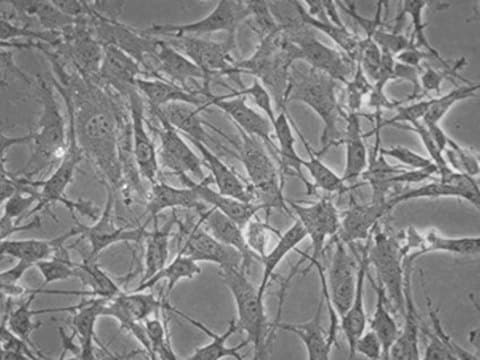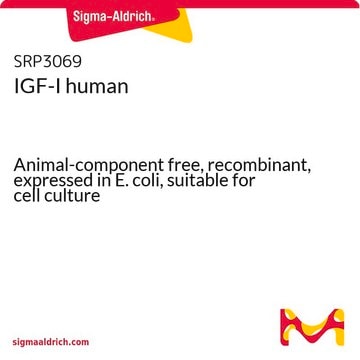推荐产品
product name
OP9-DL1 hDL-1-Expressing mOP9 Cell Line,
生物源
mouse
品質等級
包裝
vial of ≥1X10⁶ cells/vial vials
製造商/商標名
Millipore
技術
cell culture | mammalian: suitable
cell differentiation: suitable
運輸包裝
liquid nitrogen
儲存溫度
−196°C
一般說明
OP9-DL1 is a bone marrow-derived stromal cell line stably expressing the Notch ligand Delta like I (DL1) ectopically.
Notch signaling controls multiple cell fate decisions. It is initiated via engagement of the Notch receptor with its ligands (Jagged or Delta-like family members). This is followed by cleavage of the intracellular domain of Notch and its subsequent translocation into the nucleus, where it binds with the transcription factor CBF-1/RBPJ and activates transcription of various downstream target genes. Upregulation of Notch ligands is a factor in chronic inflammatory diseases including pancreatitis and diabetic nephropathy. Several studies have implicated the role of Notch signaling in early T-cell lineage commitments, as it promotes development of T-cells with αα+ T-Cell Receptors (TCRs) at the expense of αα+ TCRs 3. Bone marrow progenitor cells expressing constitutively active Notch have been shown to develop into CD4 and CD8 double-positive T cells. This signaling pathway also plays an important role in the development of CD4+ or CD8+ single positive cells from CD4 and CD8 double-positive precursor thymocytes.
OP9 bone marrow stromal cells support the differentiation of hematopoietic progenitor cells (HPCs) into multiple lineages including B-cells, but not to T-cells. This is mainly because they do not express Delta-like 1 or Delta-like 4 notch ligands inherently. OP9 cells were therefore infected with a MiGR1 retroviral vector engineered to express the human Delta-like-1 gene and green fluorescent protein (GFP). The OP9-DL1 cells were then sorted for GFP expression.
Source
GMO. OP9-DL1 cells were genetically modified from stromal cells derived from mouse bone marrow.
References
1.Immunity 2002, 17(6): 749-756.
2.J Orthop Sci. 2005, 10(6): 589-594.
3.Curr Opin Immunol. 2007, 19(2): 163-168.
4.Cold Spring Harb Protoc. 2009, 2009(2): pdb.prot5156.
Notch signaling controls multiple cell fate decisions. It is initiated via engagement of the Notch receptor with its ligands (Jagged or Delta-like family members). This is followed by cleavage of the intracellular domain of Notch and its subsequent translocation into the nucleus, where it binds with the transcription factor CBF-1/RBPJ and activates transcription of various downstream target genes. Upregulation of Notch ligands is a factor in chronic inflammatory diseases including pancreatitis and diabetic nephropathy. Several studies have implicated the role of Notch signaling in early T-cell lineage commitments, as it promotes development of T-cells with αα+ T-Cell Receptors (TCRs) at the expense of αα+ TCRs 3. Bone marrow progenitor cells expressing constitutively active Notch have been shown to develop into CD4 and CD8 double-positive T cells. This signaling pathway also plays an important role in the development of CD4+ or CD8+ single positive cells from CD4 and CD8 double-positive precursor thymocytes.
OP9 bone marrow stromal cells support the differentiation of hematopoietic progenitor cells (HPCs) into multiple lineages including B-cells, but not to T-cells. This is mainly because they do not express Delta-like 1 or Delta-like 4 notch ligands inherently. OP9 cells were therefore infected with a MiGR1 retroviral vector engineered to express the human Delta-like-1 gene and green fluorescent protein (GFP). The OP9-DL1 cells were then sorted for GFP expression.
Source
GMO. OP9-DL1 cells were genetically modified from stromal cells derived from mouse bone marrow.
References
1.Immunity 2002, 17(6): 749-756.
2.J Orthop Sci. 2005, 10(6): 589-594.
3.Curr Opin Immunol. 2007, 19(2): 163-168.
4.Cold Spring Harb Protoc. 2009, 2009(2): pdb.prot5156.
應用
- Each vial contains > 1X106 viable cells.
- Cells are tested negative for infectious diseases by a Mouse Essential CLEAR Panel by Charles River Animal Diagnostic Services.
- Cells are verified to be of mouse origin and negative for interspecies contamination from human, rat, Chinese hamster, Golden Syrian hamster, and nonhuman primate (NHP) as assessed by a Contamination Clear panel by Charles River Animal Diagnostic Services
- Cells are negative for mycoplasma contamination.
特點和優勢
OP9 bone marrow stromal OP9-DL1 cells support the differentiation of embryonic or hematopoietic stem cells from fetal liver or bone marrow into T lymphocytes. Holmes et. al., has provided a detailed protocol to differentiate embryonic or hematopoietic stem cells into T lymphocytes using the OP9-DL1 system. The OP9-DL1 cell line is an important tool for the exploration of the role of Notch signaling in cellular differentiation and genesis of inflammatory disease states.
儲存和穩定性
OP9-DL1 cells should be stored in liquid nitrogen. The cells can be cultured for at least 10 passages without significantly affecting cell marker expression and function.
其他說明
This product is intended for sale and sold solely to academic institutions for internal academic research use per the terms of the “Academic Use Agreement” as detailed in the product documentation. For information regarding any other use, please contact licensing@milliporesigma.com.
免責聲明
Unless otherwise stated in our catalog or other company documentation accompanying the product(s), our products are intended for research use only and are not to be used for any other purpose, which includes but is not limited to, unauthorized commercial uses, in vitro diagnostic uses, ex vivo or in vivo therapeutic uses or any type of consumption or application to humans or animals.
儲存類別代碼
12 - Non Combustible Liquids
水污染物質分類(WGK)
WGK 3
閃點(°F)
Not applicable
閃點(°C)
Not applicable
我们的科学家团队拥有各种研究领域经验,包括生命科学、材料科学、化学合成、色谱、分析及许多其他领域.
联系技术服务部门







